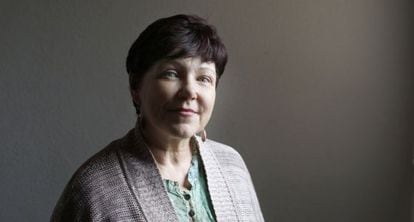My life as a priest’s wife
Spaniard Emilia Robles is one of the few women who have been allowed to marry a Catholic minister Pressure on the Church to reconsider the rule of celibacy is growing

Emilia Robles is president of the Spanish association Proconcil, which wants the Vatican to reconsider several rules that the Catholic Church lives by, including the celibacy of priests.
This wish has recently been backed by a letter to Pope Francis signed by 26 Italian women who have all been romantically involved with priests – or would like to be, but are refraining due to social pressure – asking him to eliminate the rule.
“We love these men and they love us. Such a strong, beautiful tie should not be broken,” reads the letter, which has brought back to the fore the old debate about celibacy – a tradition that has caused around 100,000 ordained priests to hang up their robes since the 1970s.
Emilia Robles happens to be married to a priest. “But this is not the main aspect of my life,” she explains. “I started working in a factory, and I was an active member of the JOC [Christian Worker Youths, a left-wing Catholic movement]. I met another member who happened to be a priest. It was a beautiful accident, but it has not defined my life. That was in 1973. He felt the calling, and the communities he was working with wanted him to stay. We talked to the bishop and with all the communities he had worked with, so they wouldn’t feel betrayed. There was a law, but even though laws can sometimes change, we didn’t want to turn this into a challenge. It’s a matter of historical patience.”
What is the point of remaining celibate if you are married to money?”
Robles says they didn’t get any trouble over the marriage with Church authorities.
“My husband never made a salary from the Church,” she notes. “He was not officially appointed to any parish. He did more or less what they let him do, depending on the priest who happened to be there. This eliminated a problem for the Church, which wonders if besides paying the priest’s expenses, it will also have to pay for the wives and children. Other churches deal with this in several ways; the priest can work part-time and support himself and his family, and still be in touch with the bishop.”
Catholic priests who want to get married are normally required to ask Rome for a dispensation, and to visit a psychologist to obtain a certificate saying they were immature, which could help get permission, Robles explains.
“By obtaining that dispensation, they are still priests but can no longer administer the sacraments, unless the community needs them to. Many [priests] ended up leaving the Church, people who felt a strong commitment and who had very good training. And that’s a loss. The Church will now probably consider new forms of ministry, and will have to figure out how to attract those people back. We cannot spare anyone, especially those with long years of training."
Some priests start leading double lives, and the women live in hiding”
Regarding the collective letter to Pope Francis, Robles says that “people’s suffering must be heard.”
“Secrecy is not good for anybody, because it does not help you grow and because it covers up for many things. Some priests start leading double lives, and the women are in hiding. That is a problem that needs addressing, though it is not at the heart of the problem.”
According to Robles, dialogue is the main thing. “Getting married is not so much a right that the priest has; rather, the community must be willing to have both married and single priests. There will always be priests who are voluntarily single. But those vows have to go hand in hand with the other vows, such as the vow of poverty. What is the point of remaining celibate if you are married to money?”
The new secretary of state for the Vatican, Pietro Parolin, has admitted that “celibacy can be discussed because it is not a dogma, but a Church tradition.” But Pope Francis has always expressed support for celibacy among priests.










































